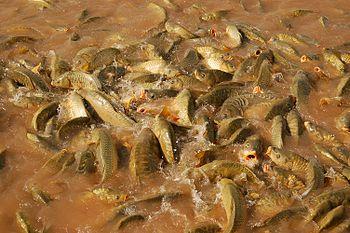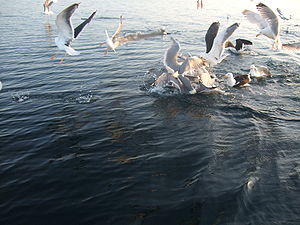
Common carp (Cyprinus carpio) competing for food at the pond of the Royal Palace Agdal of Marrakech in Morocco

Herring gulls and great black-backed gulls in Vestfjord, Norway eating fish remnants after fishers cleaned their catch.
In ecology, a feeding frenzy occurs when predators are overwhelmed by the amount of prey available. For example, a large school of fish can cause nearby sharks, such as the lemon shark, to enter into a feeding frenzy.[1] This can cause the sharks to go wild, biting anything that moves, including each other or anything else within biting range. Another functional explanation for feeding frenzy is competition amongst predators.[2] This term is most often used when referring to sharks or piranhas. It has also been used as a term within journalism.[3]
See also
- Bait ball
References
- ^ Bright, Michael (2000). The private life of sharks : the truth behind the myth. Mechanicsburg, PA: Stackpole Books. ISBN 0-8117-2875-7.
- ^ Staddon. Adaptive Behavior and Learning. Foraging and Behavioral Ecology. Retrieved from: http://psychandneuro.duke.edu/uploads/assets/Chapter09.pdf Archived 2016-03-04 at the Wayback Machine
- ^ Feeding frenzy:how attack journalism has transformed American politics, Sabato, Larry., Macmillan., 1991